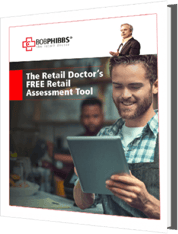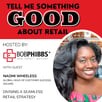Retail Podcast 219: Al Gerrie, CEO Zig Zag | Retail's Dirty Secret: Returns

Bob Phibbs interviewed Al Gerrie, Founder and CEO of ZigZag Global on the challenges of retail returns across the globe, how they vary by country and what his company is doing to make it easier for both consumer and retailer.

Tell me something good about retail
Al Gerrie, CEO Zig Zag: Retail's Dirty Secret: Returns
Bob: Welcome, Al Gerrie, of ZigZag. So, who are you and what do you have to do with retail?
Al: ZigZag is a technology solution that helps retailers manage returns both domestically and globally. So, we plug into various different retailers and help them bring back returns into their supply chain and help refund their consumers more quickly.
Bob: Sounds boring. Why do I have to worry about returns? There's only a couple of returns that I have to deal with, right? In my stores or my online or is that a problem worldwide?
Al: Well, it's a global issue. We've got around 89% of consumers in the UK now checking returns policies before buying and over 80% of those customers will never shop again if they've got a bad returns experience. So, it's vital that a brand gets that right. About a third of shoppers are now buying with the intention of returning a product. So they're buying two or three sizes and they know they're going to return one before they've even clicked the checkout.
Bob: Now, what about people buying then wearing it and returning? Is that growing?
Al: Yes. We're seeing two ways that's growing. First of all, consumers are, as I say, buying multiple sizes, multiple colors, and sending back. And if you look at markets like Germany, for instance, they can experience return rates as high as 70% in women's fashion. So, it's a huge issue. And payment methods are changing. So people [inaudible 00:01:32] try before you buy schemes. And even Urban Outfitters this week announced something called "Newly" which is a rental scheme. So, in essence, that's a returns business where fashion retailer is renting clothes to buyers rather than selling.
Bob: Where are some of the dropoffs that can really cost them?
Al: The biggest question that a retailer gets asked is, "Where is my refund after the orders arrived?" So, the first is where's my order? And the second is, where's my refund? So, there's a customer service cost to managing those questions and customers want a few basic things from a retailer. They want an easy transparent returns policy, they want convenient options that are both free and paid. Potentially, there would be collections and dropoffs from home. They don't always wants to have to walk stuff back into a store and they want a faster refund. It's critical now that the buyer gets their money back quickly if there's an issue with that purchase.
Bob: And what about for the retailer's side of it? Where's the money for them? Because I always think of if someone's buying, let's say four dresses, four different sizes of a dress and they buy it and then they return it. And I don't know what the return policy is. There's people up to a year, there's people three months, there's other people that are shorter, but now it comes back, maybe two of them are slightly damaged or worn and the other two are way out of season. Is that a problem?
Al: Yes. It's a huge issue. So, the speed of refund is critical to get those products back into the supply chain more quickly. And it might seem slightly counterintuitive but if you know that a customer has bought three or four items in different sizes, you can pretty much guarantee that there's going to be a refund there. So, encouraging that customer to return earlier, even though that might seem an unusual way of doing business, is actually going to get those goods back into the supply chain when they are a high value and when they're still in fashion.
Bob: So, I'm a brand, I would come to you and say, "Take over my returns." Is that correct?
Al: Yes. ZigZag is a SaaS provider, we plug into the website to take a copy of the order at the point of dispatch, so we know what was in the basket. And we localize that returns experience for the consumer. So, we're collecting data around why that customer is retaining the products and then we're providing over 100 carrier services around the world to help them bring that back into the supply chain. So, it could be a pickup or a dropoff collection from home through a carrier and then that comes into a local warehouse.
We've got 220 warehouses currently in 130 countries that allow those consumers to get that local experience. So, if I'm a consumer, I'm just returning through my local carrier back to a local warehouse, which really brings down that time of refund. And if I'm the retailer, I care about improving the refund speed, boosting the loyalty. So, making that customer have a good returns experience so they shop again and reducing the cost of that so that the customer doesn't have to post goods from one side of the planet to the other. Obviously, international retail is growing both in the states and everywhere.
Bob: Well, the other thing that I think is interesting about that is you're also getting rid of it, which doesn't sound quite nice, but a lot of retailers are pretty much saying if you return it, in fact, we've all had it, right? You do something from Amazon and you return it and they're like just keep it. We don't even care, we don't want it. And then there's other people that sideline the store and once it comes back, it's not going back into the store. You're going to take it and it's going to go to a off price and then maybe off price is full so it's going to go to maybe another country and then if it doesn't get it there, it's going to go. We're overrun with returns right now, aren't we?
Al: That's right. We're using predictive analytics to understand where is the consumer and where's the product and what's the demand for that product in that local market? What's the cheapest method of moving it back somewhere? And then how do we dispose of that product, either by refilling it to a new customer, we could resell it through a marketplace, we could recycle it, we could donate it to a charity, we could wholesale it to a third party liquidator like TK Maxx or so and so in local country. So reducing the cost of that.
We're also providing all the customs documentation. And that whole returns experience from the consumer takes less than 60 seconds. So, it's a very slick process. One of the key things we do is we remove the label in the box. So, whilst we can still support label in the box, if you've got a label in the box, you don't know what's coming back until it arrives in your warehouse. And you can't necessarily control the destination of those goods dynamically. If you've got a returns portal, you can actually have a lot more control over the cost, the direction, and the visibility about what's coming back and why.
Bob: Wow. Are high streets doomed? I read about it a lot that they always talk about it or there just like we do in the states about main street. Taking off your ZigZag hat, what are some of the challenges that you think retailers could fix when it comes to the high street?
Al: We're seeing models both in the U.S. and the UK now where any store can accept another retailer's goods and that's really interesting. So, Walgreens did that recently in the U.S. and we got retailers in the UK starting to do that now with different high street stores accepting what used to be considered competitive returns into their own stores now.
Bob: So, who do you think that benefits? Because it's [inaudible 00:07:33]. I understand the benefits to the customer because it's easy, but at the end of the day, are they hoping that any trip into the store gives me a chance to win you over or?
Al: Yes. I think it's exactly that. It's footfall. Footfall has been on the decline and they need to become relevant and providing that convenience to the consumer that might just tip them back on to the radar is very interesting.
Bob: Well, I know that when I was at NRF recently, they talked about the reason there's so many robots coming into retail is for one simple reason that if you're not going to be making a trip to the store, something is going to have to take that merchandise from the store or a warehouse. And there physically aren't enough hands to do that, which is alarming. It's like wow, really?
Al: Yes. I definitely think you're going to see different transportation models as cities get clogged up and want to become more sustainable. So, there's an aspect that ZigZag has around reducing the air miles that products need to travel and stopping double handling as well. So, for instance, if you're returning a shirt back to a retailer and we can find a store that needs that product without having to send it to the warehouse first, then we can cut load of costs there. And another thing that's really important for sustainability is going paperless. So, consumers don't want to have to print stuff out at home anymore, they want the paperless return that they do through their mobile phone and they just hand the goods over. So, that's the future.
Bob: Another thing that's interesting when it comes to returns is like Macy's backstage. They decided they're not going to provide a third place, they're going to try to move them through their own stores and they think that's the way forward. Personally, I think that's a confusing dynamic in a full price store because I think you attract people to the off-price and then hope they're going to go to the full price instead of the other way around. So, any thoughts on that? Is that the confusion?
Al: Yes. Actually, in the UK, we're seeing the opposite of that. So, the high-end stores we've got people like Selfridges as a client. They're embracing the online journey but then they're helping make that journey more convenient for the customer and they're also saying that if you buy in-store or online, you should still be able to return online if that's more convenient for you. So, we don't want to penalize you and make you come into a store if it's not convenient for you. So, I think it's an interesting tactic from Macy's but actually, I don't think it's the right answer. We do need to address what the customer wants and customers tend to vote with their feet.
Bob: No, I would agree with you. So, what do you think is the biggest challenges you've had in the past three years and how you overcame it? And that can be either through work or personal or anything like that.
Al: Well, I think building the network was a big challenge just because of the scale of what we've been trying to do. We're not trying to build a solution for one country, we're trying to build an entire global solution for the world. And last year, we managed returns in over 120 countries. So that would tell you that there's demand absolutely everywhere for this product. Returns are everywhere, doesn't matter what you sell. That's not all fashion by any means, it's all verticals. So, yes. The return rates are higher in fashion, but the convenience for that consumer and helping them get a better customer experience, it makes them a lot more loyal and likely to shop again. So, building that global network has been vital to our success.
Bob: Well, you're sure. And how is Brexit going to fit into all of that?
Al: So, yes. It's a really interesting question because Brexit actually complicates matters for retailers. Before the Brexit, you would naturally just be able to return stuff back into the UK without any hassle. But now when the goods come back, they're going to need extra paperwork. If you ask a consumer to fill that paperwork in for a customs entry, I can tell you that 100% of them will get it wrong. So, you basically need software that does that.
The problem is you can't prefill that paperwork in because you don't know what the customer is returning. So, having that automated returns process where the customer is telling you what they're sending back, our software then calculates exactly what's in the basket, what's the value of the goods, who was the outbound shipper, who was the receiver, what was the date of import and export, that is all done in a matter of seconds. So, the customer has got a customs declaration in their hand that can also be transmitted digitally and they don't have to think about Brexit.
Bob: That's good.
Al: That's an important aspect of what we do to automate the process.
Bob: Do you think that having a longer return policy boosts sales? There's like [inaudible 00:12:47] over here is I don't know. Is it 100 nights free or a year free or something? If I was a millennial, I'd be saying "I'm great. I would use this for the whole semester and then I'll return it, it didn't feel right." But any thoughts around that? Is longer return times better or?
Al: I think we've done a lot research around this. And actually, what we find is that there's a big drop off after the first 10 days that basically if they're going to return, they're going to return earlier on in that process. They're less likely to return later, even if there is a longer policy. What we do find is that if people go free returns, we see an increase of up to 25% in sales but only a 4% increase in returns. So, that's quite powerful data to actually suggest that free returns are a good thing. And it's about then managing the cost of those so that you can actually have a localized solution in each country and even on a domestic scale that you're offering different options for the consumer that are not prohibitive to doing business.
Bob: So, that's really changed with retail in the last few years. The whole concept of returns becoming its own business I think has and that it's somehow is part of your unique sales process is free returns both ways and no minimums and all of that. Any other changes around returns as you think in the last three to five years?
Al: Yes, absolutely. Amazon hasn't put a label in a box for five years now and other retailers need to catch up with that. The reason they don't put the label on the box is because they want to drive the customer back online onto their website. You can do that through a portal. We're also segmenting customers, so we're saying if you're a VIP customer, you get an instant refund. But if you're a first-time buyer, maybe we'll make you wait and you have to prove that your goods are in good condition before we will refund you. So having that data around who the good buyers and the bad buyers are is vital to what we do. And it's a big part of the future of the platform as we get more data rich. And capturing those return reasons is vital to seek and identify the serial returners. You can also identify bad suppliers.
Bob: Nice. And what would you tell a friend going into retail?
Al: It depends on which...
Bob: Which friend?
Al: Which friend. Yes, exactly. No. I think retail is in a tough place at the moment and managing your bottom line is becoming more and more important. Pay attention to the opportunity for international. So, if you're going to sell internationally, you need four or five things. You need probably a marketplace presence, you need good translations, you need good payment gateway, you need a good outbound delivery solution, and on the back of that, you need a really solid return solution.
Bob: Good. Well, I like that. So, tell me how can they find out more about your service?
Al: So, our website is www.zigzag.global. And we have plugins for the leading shopping cartridges like Shopify, Magento, Salesforce, BigCommerce, ChannelAdvisor, and Lim Works. And if you're on any of those platforms, you can be live on the ZigZag solution inside an hour.

Find out more about Al

Take My FREE Retail Assessment Quiz
Use this free Retail Assessment Tool to discover where you truly excel in retail, and uncover areas for improvement.


